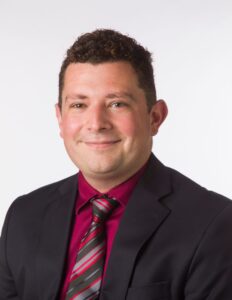Faculty Highlight: Dr. Andrew Yockey
- April 30, 2024
- By: Sally Crocker
- Our People
Related Links
 Dr. Yockey is an assistant professor, population and community health, at The University of North Texas Health Science Center’s School of Public Health, with a joint appointment as assistant professor for TCOM’s department of internal medicine and geriatrics. He recently served as a plenary speaker for the Nevada Public Health Association’s annual conference, speaking on “Preventing Substance Use Among LGBTQ Youth: An Update of Harm Reduction Strategies.” Event attendees came from the University of Nevada Las Vegas, University of Nevada Reno, and state and local health departments.
Dr. Yockey is an assistant professor, population and community health, at The University of North Texas Health Science Center’s School of Public Health, with a joint appointment as assistant professor for TCOM’s department of internal medicine and geriatrics. He recently served as a plenary speaker for the Nevada Public Health Association’s annual conference, speaking on “Preventing Substance Use Among LGBTQ Youth: An Update of Harm Reduction Strategies.” Event attendees came from the University of Nevada Las Vegas, University of Nevada Reno, and state and local health departments.
“Your presence and knowledge helped to fulfill our mission of supporting research to improve health outcomes in Nevada,” said Dr. Kavita Batra, UNLV faculty member and NPHA president-elect.
Dr. Yockey collaborates with researchers and communities across the U.S. to help address some of public health’s most pressing concerns.
Q: Dr. Yockey, what are the specifics of your work in helping to prevent substance use among LGBTQ youth?
A: My research investigates the risk factors and psychosocial mechanisms associated with substance use among LGBTQ+ youth. My research with national colleagues shows that connectedness, support and increased access to behavioral health tools are some of the first steps to decreasing or preventing substance use in these communities.
Q: How is your research in this area helping to find solutions for healthier communities?
A: This research contributes to the broader goal of promoting healthier communities in several ways:
Health Care Accessibility: By analyzing data and trends in these populations, I can identify gaps in accessibility and suggest solutions to improve health care access for underserved communities. This might involve proposing telemedicine solutions, mobile clinics or community health centers.
Public Health Initiatives: Understanding patterns of substance use spread and risk factors allows for the development of targeted public health campaigns. These campaigns can raise awareness, promote preventive measures and encourage healthier behaviors among the population.
Health Education: By generating informative content, my work can help educate individuals about LGBTQ+ health and the warning signs. Well-informed communities are better equipped to make healthier choices.
Mental Health Support: Researching mental health issues allows for the development of better support systems and resources for those struggling with mental health challenges. This can include online therapy platforms, community support groups and destigmatization campaigns.
Q: Is substance abuse among LGBTQ youth a national concern? How do the statistics vary by state or region?
A: Overall, substance use is a huge concern for LGBTQ+ youth. They are at nearly double the odds for initiating marijuana and alcohol use. Our research also shows they are more likely to initiate marijuana at an earlier age, compared to non-LGBTQ+ youth. We do not have a good “national” picture yet, but rural LGBTQ+ individuals have even higher odds for substance use.
Q: What is unique about your work/research?
A: My work/research takes a national perspective inside the newest trends and provides the most up to date picture for substance use and mental health trends using advanced statistics.
Q: What led you to the field of public health?
A: I wanted to make an impact for marginalized communities and help them lead healthier, more productive lives.
Q: How does your work tie in with the School of Public Health’s mission, vision and strategic plan, Impact 2030 – Commitment to Community?
A: My work is community-based, so informing communities of these data and these trends will help them become more aware, to initiate public health campaigns for change.
Q: What do you most enjoy about working in public health and at HSC?
A: HSC gives me an environment to grow and thrive in the field of public health.






Social media